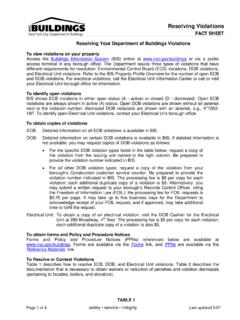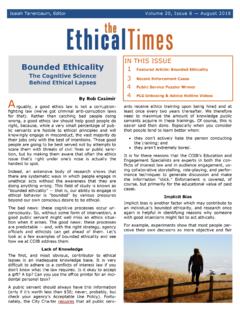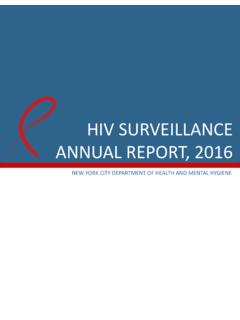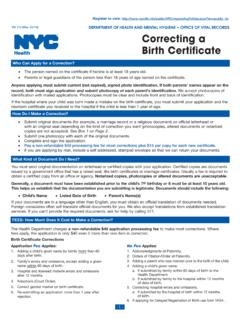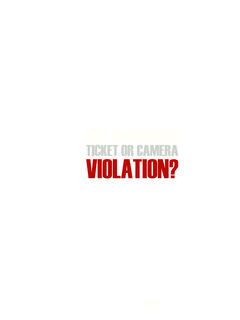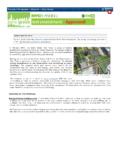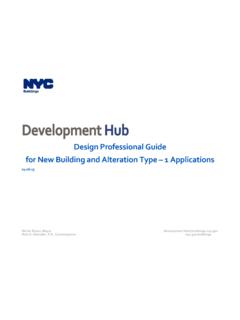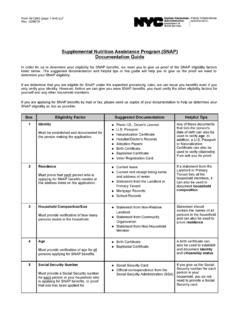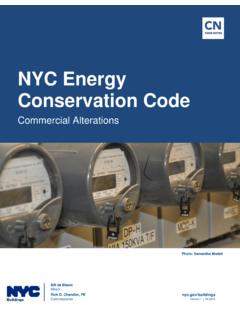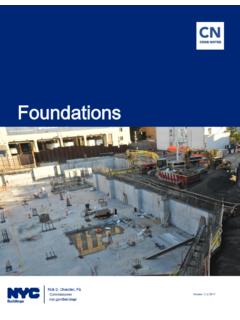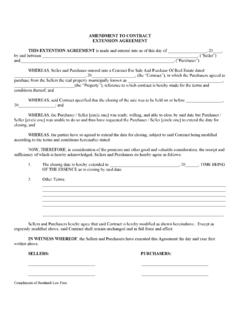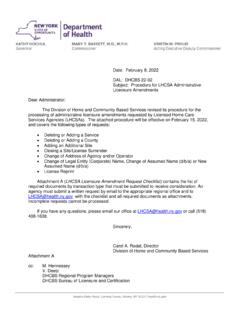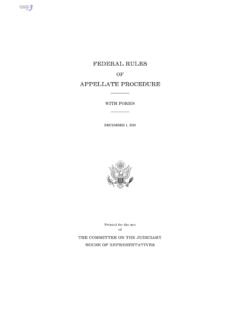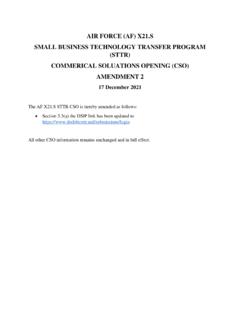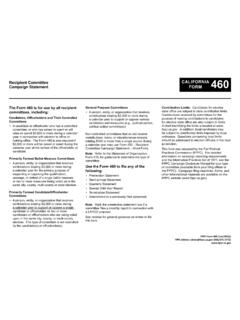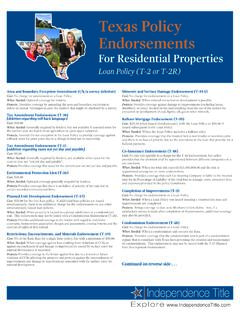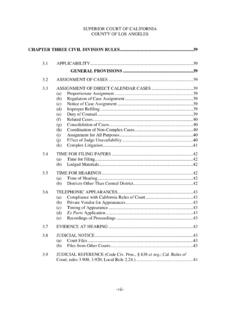Transcription of EDUCATION DEVELOPMENT AMENDMENT CLIMATE …
1 Social Justice Recommendationsfor Mayor-ElectEric AdamsDECEMBER 2021 ECONOMICDEVELOPMENTEDUCATIONFIRSTAMENDME NTHOUSINGLAND USECLIMATE CHANGEHEATHEALTH RIKERSPOLICING AND CRIMINAL LEGALSYSTEMNew Yorkers for Social Justice:A Citizens' Commission Making Recommendations to Eric Adamsi TABLE OF CONTENTS Page I. Introduction .. 1 II. Freedom of Speech .. 4 III. Policing and the Criminal Legal System .. 8 IV. Reforming and Closing Rikers .. 17 V. Housing and Homelessness .. 23 VI. Health .. 28 VII. Heat .. 40 VIII. CLIMATE Change and Environment .. 43 IX. Land Use and a Comprehensive Planning Framework .. 53 X. Economic DEVELOPMENT .. 61 XI. EDUCATION .. 66 XII. Miscellaneous Recommendations .. 67 XIII. Conclusion .. 70 XIV. Acknowledgements .. 71 XV. Biographies .. 73 January 1, 2022, Eric Leroy Adams will become the 110th Mayor of the City of New York. The substantial and numerous challenges facing the new Mayor and the Administration range from recovery from COVID-19 and its effects to public safety, police-community relations, affordable housing, homelessness, CLIMATE change, economic DEVELOPMENT , free speech and assembly, criminal justice, and discrimination, among other issues.
2 As New Yorkers, we are optimistic that Mayor Adams and the Administration can provide the necessary leadership to meet these challenges and become a unique model for how to govern a city that is both safe and just. To assist in this achievement, we came together this past August to form New Yorkers for Social Justice: A Citizens Commission Making Recommendations to Eric Adams. Although independent, the Commission was created with the knowledge and approval of Mr. Adams. Its goal is to produce a Report to Mayor Adams clarifying the meaning of social justice as it relates specifically to obligations that the City of New York should have to its residents, and that the Mayor can implement or initiate through identifiable practical steps and programs. Toward that end, this Report will set forth a list of social justice commitments that the Mayor s office should make to the residents of New York City. If implemented, such commitments would effect a historic transformation of the relationship between a municipal government and its constituents.
3 The members of the Commission are: Chair, Norman Siegel, civil rights attorney, partner Siegel Teitelbaum & Evans, LLP Dennis Flores, community activist, co-founder of El Grito of Sunset Park Hon. Marcy S. Friedman, Retired New York State Supreme Court Justice Ira Glasser, former Executive Director American Civil Liberties Union Dr. Tarry Hum, Professor and Chair of Queens College Department of Urban Studies Steven Hyman, partner McLaughlin & Stern, LLP Dr. Micaela E. Martinez, Assistant Professor, Emory University (Department of Biology); Adjunct Assistant Professor, Columbia University (Department of Population and Family Health) Terry McGovern, Professor and Director of Global Health, Justice & Governance, Columbia University School of Health2 Harriet R. Michel, former Executive Director, New York Urban League Aryana Swanson, third-year student, Columbia University Earl S. Ward, criminal defense attorney, chair, Housing Works, Bronx defenders;partner Emery Celli Brinckerhoff Abady Ward & Maazel, LLP1 The goal of the Commission s work is to expand upon the concept that publicsafety is the prerequisite to prosperity 2 to the larger notion that public safety and social justice are the prerequisites to prosperity.
4 In our view, public safety and social justice are best achieved when they work in tandem. The Commission believes that social justice principles and values in New York City mean, at a minimum, freedom, justice, equality, equity, fairness, and opportunity for all. Social justice is a communal effort dedicated to creating and sustaining a fair and equal society in which each person and all groups are valued and affirmed. 3 It encompasses efforts to end systemic violence and racism, recognizes the legacy of past injustices, and promotes individual empowerment and communal According to the United Nations, social justice embraces peaceful and prosperous coexistence and the removal of barriers that people face because of gender, age, race, ethnicity, religion, culture or disability. 5 The Commission would add sexual orientation and socioeconomic status to this list. In a just society, each individual matters, their rights are recognized and protected, and decisions are made in ways that are fair and honest.
5 6 Commission member Ira Glasser postulated that we want to have a city where it s easy to be free and safe to be different and that we encompass all of the freedoms guaranteed by the Bill of Rights, in addition to equal access to health care, housing, economic rights, and public safety. Commission member Dr. Micaela Martinez suggested that our work capture what the group believes are fundamental human rights to everyone in the city, and also acknowledge legacies of systemic harm perpetrated against certain groups. 1 More detailed biographies of the Commission members are provided at the end of this Report. 2 Eric Adams, Twitter (Jun. 8, 2021), 3 Our Definition of Social Justice, John Lewis Inst. for Soc. Just. at Cent. Conn. State Univ., (last visited Dec. 7, 2021). 4Id. 5 World Day of Social Justice 2020, United Nations Dep t of Econ. and Soc. Affs. (2020), : Social Justice, Oxford Reference, (last visited Dec.)
6 7, 2021). 3 Commission member Dr. Tarry Hum identified principles highlighted in her course The Just City: Theory and Practice at Queens College, which include procedural, distributive, and restorative justice. The Commission also believes that its recommendations should include those actions that primarily are within the jurisdiction and powers of the Mayor, as set forth in the City Charter. Chapter 1, Section 8 of the Charter provides, The mayor shall be responsible for the effectiveness and integrity of c ity government operations and shall establish and maintain such policies and procedures as are necessary and appropriate to accomplish this responsibility including the implementation of effective systems of internal control by each agency and unit under the jurisdiction of the mayor. 7 Our hope is that our 81 recommendations will benefit Mayor Adams and his Administration in defining their goals and aspirations for New Yorkers as they govern for the next four years.
7 Each section of the Report identifies specific recommendations with analysis and description of the underlying problem, as well as the rationale for the recommendation. 7 1 Charter 8. 4 II. Freedom of Speech Introduction The struggles of oppressed and relatively powerless people for social justice have always required freedom of speech in the way that a new plant requires water and sunlight. Historically in the United States, every fight for social justice began with free speech, and depended on the right to speech to initiate and sustain a movement. At the turn of the 20th century, the movement to end lynching of Black people, led by courageous advocates like the journalist Ida B. Wells, depended upon freedom of speech and the right to publish and spread the word about the epidemic of lynching in the land, in order to gather and build opposition to it. The nascent labor movement critically required and often in the early days did not enjoy the right to meet, to leaflet, to demonstrate, and to picket in order to convert their powerlessness into success against oppressive employers.
8 In 1916, Margaret Sanger, the founder of Planned Parenthood, was arrested in New York City for distributing informational leaflets on birth control to women subjugated by unwanted pregnancies. Decades later, the civil rights movement that finally ended the dominion of Jim Crow in hotels and restaurants and swimming pools and public toilets, on juries and in employment and housing and voting, could not have flourished or succeeded without the First AMENDMENT to protect the efforts to call attention to the abuses of skin-color exclusions and build the support needed to end them. In 1955, when Rosa Parks sat down in a seat reserved for whites on a bus in Montgomery, Alabama, and a then-unknown young Baptist minister named Martin Luther King, Jr. stood up to support her by organizing a boycott of those buses, their actions were protected by the First AMENDMENT . The same was true of the countless other demonstrations, sit-ins, and marches during the years that followed, including the one across the Edmund Pettus Bridge in Selma, Alabama that helped build support for the Voting Rights Act of 1965.
9 That is why one of the heroes of that march in Selma, the much revered John Lewis, was a fierce advocate for freedom of speech. As Lewis said, Without freedom of speech and the right to dissent, the Civil Rights movement would have been a bird without wings. 8 8 Russell L. Weaver et al., Constitutional Law: Cases, Problems, and Materials 2019 Supplement 200 (4th ed. 2019). 5 And that is also why Martin Luther King, Jr. was such a strong supporter of the First AMENDMENT . In New York City, the fight for social justice and the fight for freedom of speech are inseparable. Recommendations The First AMENDMENT to the United States Constitution protects free speech by barring the government from picking and choosing which speech to permit and which to prohibit. No government official, including a New York City official, has the power under our Constitution to bar speech based on its content or the identity of the speaker.
10 The Mayor and all city agencies and public officials are bound by and have an affirmative obligation to comply with the First AMENDMENT and similar provisions in the New York State Constitution, which include the following principles: 1. In regulating speech and assembly activities, no decisions shall be based on the content of speech or the views of speakers. 2. Regulations shall be limited to time, place, and manner in ways that respect the rights of others ( , prohibiting sound amplifiers near churches or schools when they are in session, or activities that block entrances to buildings or shops or hospitals), but that do not effectively deny speakers access to their target audiences. 3. Closely related to the right to speak is the right to relevant and easily accessible information. Accordingly, every city agency shall have an affirmative obligation to routinely provide detailed information about its policies, practices, and activities in publicly accessible ways, without the public having to initiate inquiries or litigate if such inquiries are denied.
